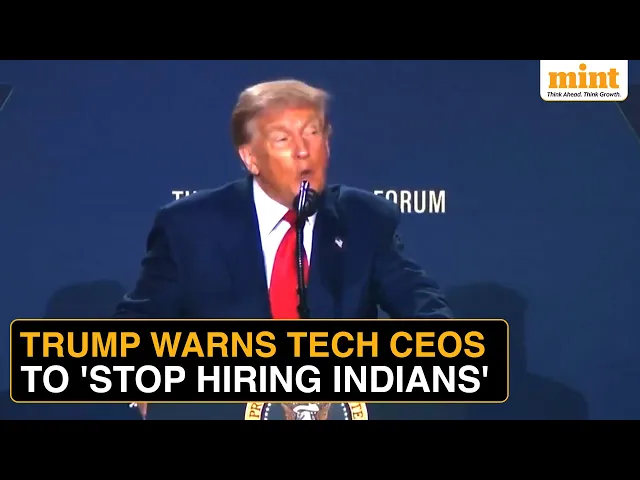‘Hire Americans, Not Indians’: Trump’s Message To Google, Microsoft At AI Summit

Trump vs tech giants: border walls for coders
In an era where artificial intelligence and tech talent dominate corporate strategy conversations, politics has now firmly entered the chat. At a recent AI summit, former President Donald Trump directed pointed remarks at tech giants Google and Microsoft, urging them to "hire Americans, not Indians" – a statement that reverberates through Silicon Valley's globally-sourced talent corridors. This latest collision between nationalism and the technology sector's traditional reliance on international expertise signals potential seismic shifts in how major companies approach talent acquisition.
Key insights from Trump's tech industry comments
-
Trump explicitly targeted major tech companies with a call to prioritize American workers over Indian talent, reflecting his "America First" approach to employment and immigration that could significantly impact tech industry hiring practices if implemented.
-
The statement comes amid growing tensions around H-1B visas and skilled immigration – programs that tech companies have historically relied upon to fill specialized roles in AI, software development, and other technical fields.
-
This rhetoric arrives at a pivotal moment when American tech companies are competing globally for AI dominance while simultaneously navigating workforce reductions and economic uncertainties.
The economic nationalism paradox in tech
The most revealing aspect of Trump's messaging isn't the statement itself but how it contradicts the fundamental reality of today's technology ecosystem. Silicon Valley was built on a foundation of global talent. When we examine the creation stories of America's most valuable tech companies – from Google to Microsoft to Apple – we consistently find immigrant founders or first-generation Americans at the helm. Restricting access to global talent pools could ultimately weaken, not strengthen, American technological competitiveness.
This matters tremendously because we're witnessing an unprecedented race for AI dominance between the United States and other global powers, particularly China. According to data from the National Foundation for American Policy, foreign-born workers comprise more than 60% of graduate students in computer science and engineering at U.S. universities. Cutting off this pipeline would create an immediate talent vacuum that domestic graduates alone cannot fill – at least not in the short term.
What the summit discourse missed
The conversation around tech hiring tends to frame the issue as a binary choice: hire American or hire foreign. This oversimplification ignores the complex talent ecosystem that actually exists. Companies like Google and Microsoft have established significant development centers in countries like India not just for cost
Recent Videos
How To Earn MONEY With Images (No Bullsh*t)
Smart earnings from your image collection In today's digital economy, passive income streams have become increasingly accessible to creators with various skill sets. A recent YouTube video cuts through the hype to explore legitimate ways photographers, designers, and even casual smartphone users can monetize their image collections. The strategies outlined don't rely on unrealistic promises or complicated schemes—instead, they focus on established marketplaces with proven revenue potential for image creators. Key Points Stock photography platforms like Shutterstock, Adobe Stock, and Getty Images remain viable income sources when you understand their specific requirements and optimize your submissions accordingly. Specialized marketplaces focusing...
Oct 3, 2025New SHAPE SHIFTING AI Robot Is Freaking People Out
Liquid robots will change everything In the quiet labs of Carnegie Mellon University, scientists have created something that feels plucked from science fiction—a magnetic slime robot that can transform between liquid and solid states, slipping through tight spaces before reassembling on the other side. This technology, showcased in a recent YouTube video, represents a significant leap beyond traditional robotics into a realm where machines mimic not just animal movements, but their fundamental physical properties. While the internet might be buzzing with dystopian concerns about "shape-shifting terminators," the reality offers far more promising applications that could revolutionize medicine, rescue operations, and...
Oct 3, 2025How To Do Homeless AI Tiktok Trend (Tiktok Homeless AI Tutorial)
AI homeless trend raises ethical concerns In an era where social media trends evolve faster than we can comprehend them, TikTok's "homeless AI" trend has sparked both creative engagement and serious ethical questions. The trend, which involves using AI to transform ordinary photos into images depicting homelessness, has rapidly gained traction across the platform, with creators eagerly jumping on board to showcase their digital transformations. While the technical process is relatively straightforward, the implications of digitally "becoming homeless" for entertainment deserve careful consideration. The video tutorial provides a step-by-step guide on creating these AI-generated images, explaining how users can transform...
